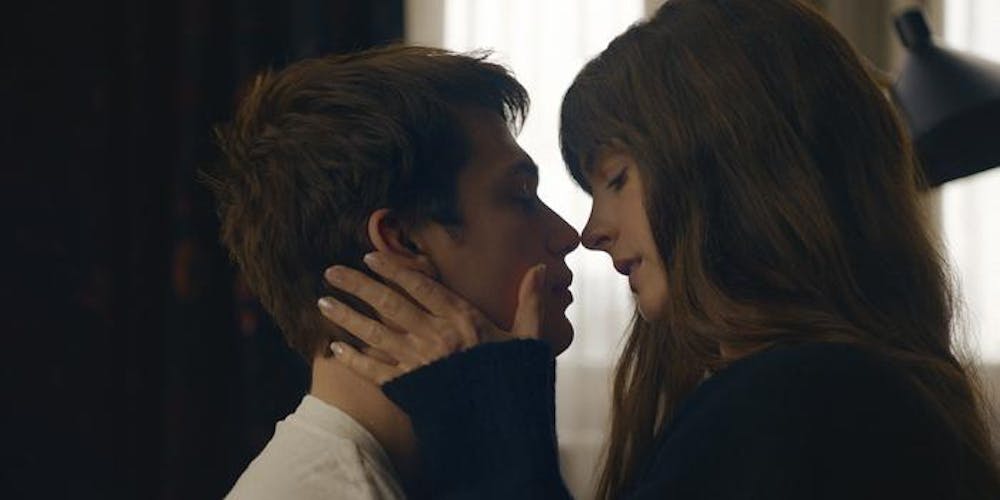It’s been a while since Anne Hathaway has graced us with a classic rom-com, so I was intrigued to watch her return to the screen as the female lead of a forbidden romance. Directed by Academy award-nominated director Michael Showalter, “The Idea of You” tells the story of a 40-year-old single mother, who accidentally finds herself caught in a passionate secret love affair with a 24-year-old pop star. A glorified One Direction fanfiction, the film can be enjoyed if you embrace its unabashedly Wattpad-esque plot.
An adaptation of the book written by Robinne Lee, “The Idea of You” was screened on Saturday in advance of its scheduled release for May 2 as part of this year’s Ivy Film Festival. After the movie, Showalter attended a talkback hosted by IFF.
The story begins with Hathaway’s character Solène reluctantly taking her teen daughter to Coachella and stumbling into Hayes Campbell (Nicholas Galitzine), the heartthrob lead singer of the boyband August Moon. Their dynamic is instantly flirtatious and he shamelessly pursues her, tracking her down after the performance and swindling her into a date. Due to their age difference, both their social circles and the media find their relationship scandalous, leaving Solène torn between her reputation, family and heart.
In the talkback, Showalter explained that drama and comedy feel the same to him. “The Idea of You” certainly had an original comedic tone, playing upon the characters’ age differences to make the age gap funny rather than creepy. Solène is laughably unimpressed by Hayes’s youthful suave “moves,” instead being attracted to his maturity and genuineness. One perfect example of their endearing banter is when he passionately texts her that he “can’t get that kiss out of (his) mind” as she lies on the couch watching TV and replies: “Who is this?”
The film also offered some incredibly touching mother-daughter moments and subtle feminist messaging. Showalter carefully used the media’s brutal lampooning of Solène as a “cougar” to pinpoint the hypocrisy of judging women who have relationships with younger men. This critique develops gradually throughout the film, drawing a grim contrast between the social acceptance of Solène’s ex-husband’s marital affair with a younger woman and the internet’s outrage towards the relationship between Solènes and Hayes.
Another interesting directing choice that Showalter pointed out was his decision to make the score of the film mirror the relationship of the couple” with half of the songs being more “contemporary and boy-band like”’ and the other half featuring slightly older female singer-songwriters, like Fiona Apple.
But several plot points felt so cookie-cutter and cheesy that they were almost satirical (think flashing colored lights over a montage of their romantic European getaway). The film’s tone kept shifting volatilely from incredibly irreverent to so emotionally sincere making it hard to distinguish what scenes were meant to be taken seriously. He’s a troubled hot British singer with daddy issues (who the writer claims is totally not inspired by Harry Styles) and she literally reads a book at Coachella? How much more fanfiction can you get?
“I was finding it funny which bits you were laughing at,” Showalter said when addressing the audience. Indeed, the auditorium was constantly filled with laughter — but not always in the way the film seemed to have intended.
Showalter described the film as “his ‘Notting Hill,’ just the other way around.” Perhaps it is Gen Z’s cringing aversion to sincerity that is partially responsible for the “death of the rom-com” so frequently described by film critics. Has there been a generational shift in what we find romantic, or have we just seen too many of these tropes before?
The film definitely suffices as a comforting watch to laugh at with your friends over a bowl of ice cream, but considering the quality of Anne Hathaway’s past rom-coms — such as “The Devil Wears Prada” and “Love and Other Drugs” — I couldn’t help expecting just a little bit more.
“The Idea of You” was certainly an enjoyable experience — but, compared to Showalter’s past award-winning rom-coms like “The Big Sick,” it felt surprisingly shallow.
Rose Farman-Farma is a sophomore Comparative Literature concentrator from England who loves writing and music.





